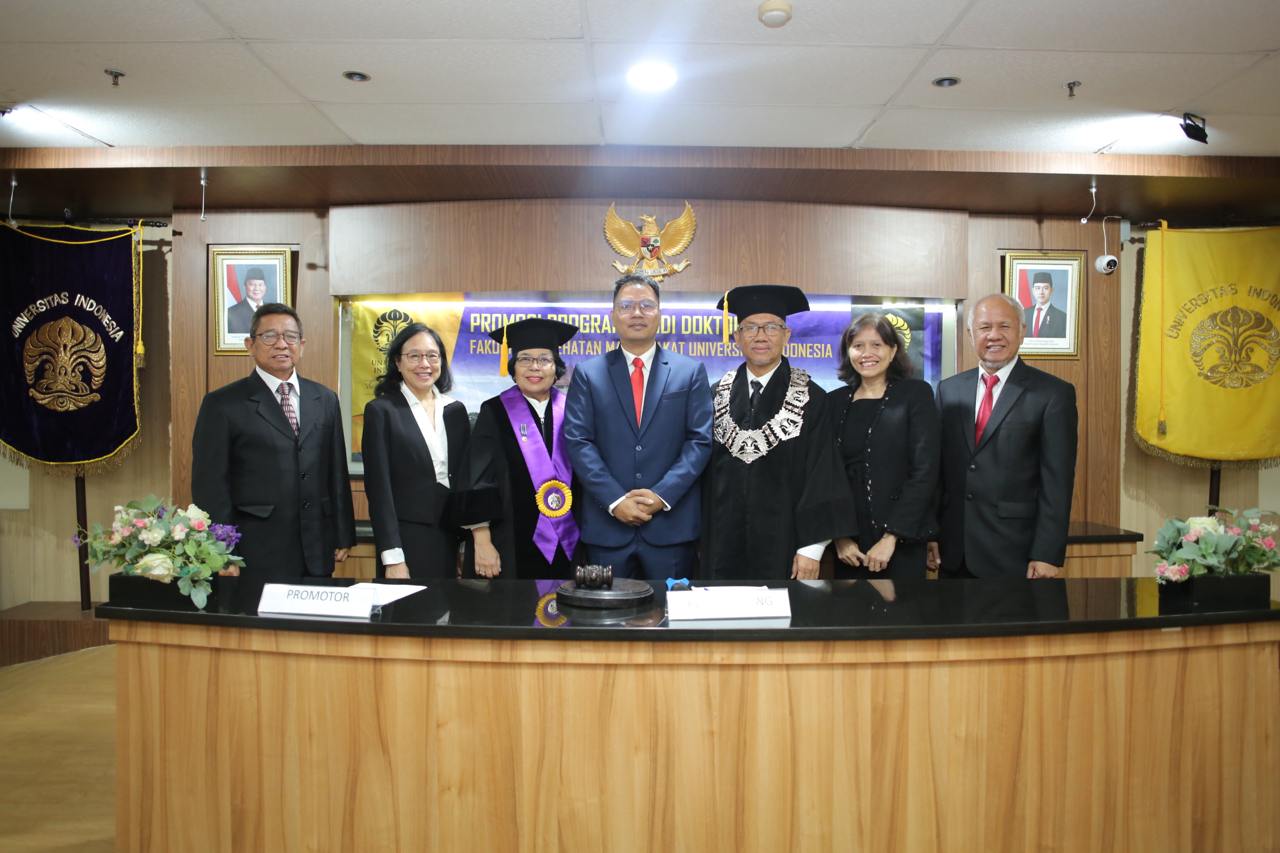On Monday, January 6, 2025, the Doctoral Program in Epidemiology, specializing in Community Epidemiology at the Faculty of Public Health (FPH) of the Universitas Indonesia (UI), held an Open Session for the Doctoral Promotion of Promovendus Forman Novrindo Sidjabat. The session was chaired by Prof. Dr. Besral, S.K.M., M.Sc., with Promotor Prof. drg. Nurhayati Adnan, M.P.H., M.Sc., Sc.D., and Co-promotors Dr. Syahrizal Syarif, M.P.H., Ph.D., and Dr. dra. Rita Damayanti, MSPH. The examination team included Prof. dr. Mondastri Korib Sudaryo, M.S., D.Sc., who is also the Dean of FPH UI; Dr. dr. Fidiansjah, SpKJ, M.P.H., a Senior Psychiatrist and Education Coordinator at RSJ Marzoeki Mahdi Bogor; and Evi Sukmaningrum, M.Si., Ph.D., a psychology lecturer and senior researcher at PUI-PT PPH, Center of Health Policy and Social Innovation, Atma Jaya Catholic University of Indonesia.
Forman defended his dissertation titled “Predictive Model for Determinants of Antiretroviral Treatment Adherence in Men Who Have Sex with Men with HIV in Kediri City.” Through his observations, Forman discovered that there is still non-adherence to antiretroviral (ARV) treatment, while the global target is for 95% of people living with HIV (PLHIV) to adhere to ARV treatment, thereby reducing the viral load of HIV in the body. “Non-adherence to ARV treatment is the behavior of not taking medication, which forms through the adaptation process influenced by various long-term factors,” Forman explained. “Men who have sex with men (MSM) with HIV may not take their medication due to unintentional factors such as forgetting or having work commitments, and intentional factors like being unable to tolerate side effects or losing motivation due to not perceiving the medication’s effectiveness,” he continued in his opening presentation.
However, based on literature review and previous studies, Forman found that there had been little exploration of ARV adherence in relation to the stages of behavior formation, starting from various background factors, behavioral constructs, the emergence of intention, and adherence behavior itself in the MSM with HIV group. This is despite the fact that intention is a determining variable in the emergence of behavior. Forman added that the MSM group was chosen as the subject of the study due to the increasing reports of new HIV diagnoses among MSM, while new HIV diagnoses in the general population have been decreasing from 2010 to 2022. “The strong MSM community makes it easier to screen and diagnose HIV+ individuals in this group. Additionally, MSM tends to have a higher awareness of getting an HIV test due to their high-risk behavior of HIV transmission,” Forman explained. “Unfortunately, ARV treatment reports are not categorized by key population groups, so we do not know which population has the highest non-adherence, which is why the high number of new HIV diagnoses in MSM, while new diagnoses in the general population continue to decrease, drew my attention to measure ARV treatment adherence in this group,” he added.
Based on these findings, Forman developed his research to create a model for predicting ARV adherence by considering various background factors and the formation of ARV adherence through the complex stages of behavioral constructs and the emergence of intention.
Forman’s dissertation focuses on enriching the Theory of Planned Behavior with background factors from a combination of the Five Dimensions of Adherence and the Whitehead-Rainbow Determinants of Health Model. The measurement of ARV adherence was conducted in a specific group and location—MSM in Kediri City—using Structural Equation Modeling Partial Least Square (SEM-PLS) analysis. Furthermore, his dissertation, based on data from 314 respondents, contributes by providing relevant instruments for the research context by adapting and modifying nine instruments for ARV adherence, including the Patient Health Questionnaire-9 (PHQ-9), 36-item Self Acceptance Barger Scale, 14-item knowledge measurement questionnaire, Perceived Social Support-Family Scale (PSS-Fa), Perceived Social Support-Friend Scale (PSS-Fr), Perceived Social Support Attending ART Clinic, Homosexuality-Related Stigma Scale, self-stigma scale, Berger HIV Stigma Scale, Standardized Brief Questionnaire Measuring HIV Stigma and Discrimination among Health Facility Staff, and the Theory of Planned Behavior measurement questionnaire.
This dissertation highlights the important role of a positive attitude toward ARV treatment and the emergence of strong intention to adhere to planned ARV treatment. These factors were found to be major determinants of consistent adherence to antiretroviral treatment. It also emphasizes the crucial role of strong social support, including family, peers, and healthcare providers. This social support significantly contributes to the perception of treatment, improving treatment attitudes, norms for adhering to treatment, and the ability to act on the treatment process, thus fostering intention to remain adherent to ARV treatment. Conversely, stigma and psychological pressure emerged as major barriers to ARV adherence because they can decrease the intention to remain adherent.
However, in the context of his study in Kediri City, Forman noted that the stigma perceived by respondents was in the low category. “This is interesting because respondents did not experience significant stigma in their daily lives, which may suggest that the education and information efforts regarding HIV have been effective in Kediri City,” Forman concluded.
Forman’s dissertation resulted in a model with a predictive ability for ARV treatment adherence in MSM in Kediri City at 77%. This model highlights the interrelationship of various factors affecting adherence. Based on his findings, Forman recommends the development of interventions that strengthen positive attitudes and intention toward ARV treatment through enhanced social support. In addition, continuous education about the benefits of ARV treatment, which can lead to undetectable and non-transmissible HIV, is necessary. Efforts should also be made to anticipate stigma and reduce psychological pressure, such as through the integration of counseling or mental health services.
Based on his dissertation, Forman Novrindo Sidjabat was awarded a Doctorate in the Field of Epidemiology. Forman is the third graduate of the Epidemiology Doctoral Program in 2025 and the 441st graduate of the Doctoral Program at FPH UI. (Promovendus)

